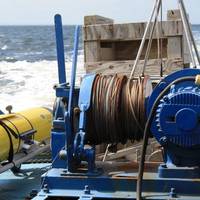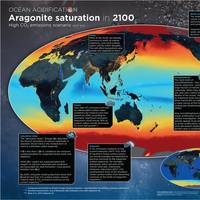Measuring the Hostile Ocean Beneath Hurricanes

Unmanned Vehicles Collect Data for Improving Storm ForecastsThe influences of ocean conditions and currents on living environments are now more widely appreciated—from the Earth’s climate and severe weather conditions to fisheries and biodiversity. Sustained and widespread measurements are needed to provide essential clues for understanding the oceans, for effective monitoring of environmental changes, and for helping to clarify the long-term effects of global warming.To meet this challenge, ocean researchers have invented various types of unmanned observing platforms.
'Great Dying' Caused by Ocean Acidification
Meet global warming's sister. Although global warming often makes headline news, acidic oceans can also have devastating effects on Earth's environment. They once triggered the "Great Dying," which was Earth's worst-ever mass extinction. Scientists said that CO2 released from massive volcanoes in Siberia turned the ocean acidic and wiped out most of Earth’s sea life during the world’s worst mass extinction event 252 million years ago. The new revelation shows dire similarities to modern climate change. The study has been published in the journal Science that reveals the first hard evidence that ocean acidification was behind the mass extinction of aquatic life on Earth.
Satellite Images Reveal Ocean Acidification
Ocean acidification can now be seen from space, highlighting an ongoing danger of climate change and revealing the regions most at risk. Pioneering techniques that use satellites to monitor ocean acidification are set to revolutionize the way that marine biologists and climate scientists study the ocean. This new approach offers remote monitoring of large swathes of inaccessible ocean from satellites that orbit the Earth some 700 km above our heads. Seawater absorbs about a quarter of the carbon dioxide, a greenhouse gas that humans release into the atmosphere each year, mostly from the burning of fossil fuels, according to the National Oceanic and Atmospheric Administration (NOAA).
Report: Ocean Acidity is Increasing ... Rapidly

The unprecedented rate of ocean acidification is one of the most alarming phenomena generated by climate change and the only way to mitigate the dangers it represents consists in reducing CO2 emissions significantly. This is the conclusion of the summary of the Third Symposium on the Ocean in a High CO2 World (Monterey, USA, September 2012) which were presented at the Conference on Climate Change taking place in Warsaw (Poland) from November 11 to 22. The document represents the conclusions of 540 experts from 37 countries reflecting the latest research on the subject.
Wendy Schmidt Ocean Health XPRIZE Offers $2 Million Award
XPRIZE announced the launch of its next major competition: the $2 million Wendy Schmidt Ocean Health XPRIZE. On the heels of the successful Wendy Schmidt Oil Cleanup XCHALLENGE, the Wendy Schmidt Ocean Health XPRIZE aims to spur global innovators to develop accurate and affordable ocean pH sensors that will ultimately transform our understanding of ocean acidification, one of the gravest problems associated with the rise in atmospheric carbon dioxide (CO2). The oceans absorb about one quarter of the CO2 that humans release into the atmosphere, causing the chemistry of the water to change and the oceans to become more acidic. As a result of increased CO2 emissions, ocean acidity is now at unprecedented levels, which could have devastating global consequences.





